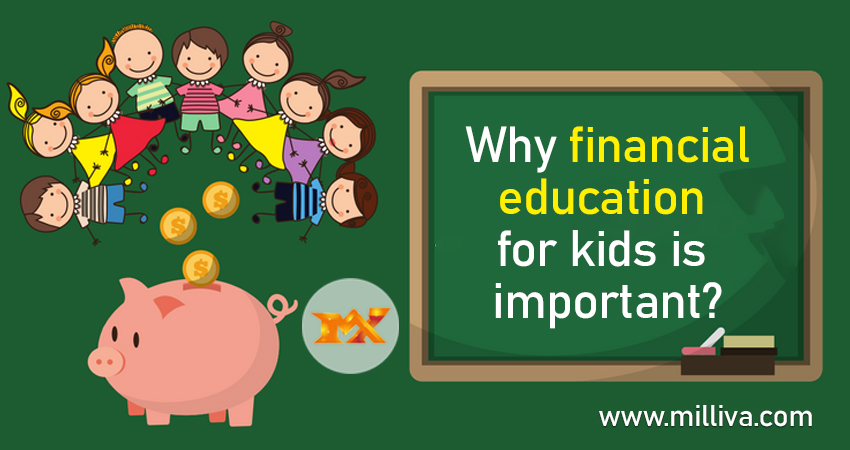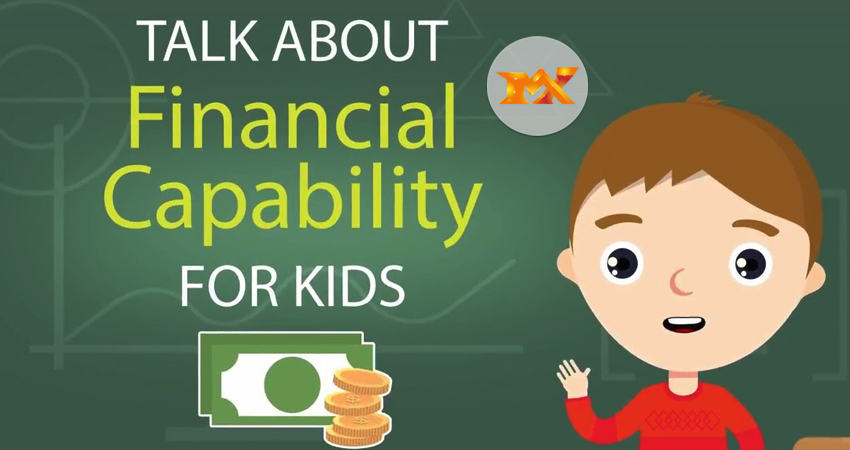Why Financial Education for Kids is Important

![]()
“The capacity to apply information and skills to make successful and informed money management decisions,” according to the definition of financial education.
As a result, financial literacy is defined as a confident understanding of topics such as saving, investing, and debt management that leads to a sense of overall financial well-being. Through experience and knowledge of financial principles and ideas such as planning, interest, money, time value, debt management, and so on, to effectively grasp and implement various financial abilities.
What Is the Importance of Financial Education?
Financial literacy allows a person to create a budgeting plan that allows him to track what he buys, spends, and owes. This topic also has an impact on entrepreneurs, who make a significant contribution to our economy’s growth and strength.
Financial literacy aids people in being self-sufficient and independent. It provides you with a foundational understanding of investment options, financial markets, capital budgeting, and other topics.
Understanding your money reduces the risk of falling victim to a scam. A few methods aren’t tough to accept, especially when they come from someone who appears to be well-versed and well-prepared. People with a basic understanding of financial literacy will be better able to anticipate dangers and argue/justify with anyone who is knowledgeable and well-informed.
What Should You Read/Learn About in Terms of Financial Education?
Budgeting and budgeting approaches
System of direct and indirect taxation
Slabs of direct taxation
Keeping track of your income and expenses
Managing EMIs for loans and debt
Fixed vs. variable interest rate systems
Transaction studies in business and organizations
Accounting and Bookkeeping for Beginners
Inflows and outflows of cash Statements
Personal finance and investment management
Asset management is the process of managing one’s assets.
Techniques and talents for business negotiations
Decision-making can be made or bought.
Markets for financial instruments
Owners’ funds and borrowed monies make up the capital structure.
Risk Management Fundamentals
Fundamentals of microeconomics and macroeconomics
How to Teach Financial Education to Pre-Schoolers and Kindergartners?
1. Save in a Transparent Jar
The piggy bank is a terrific idea, but it lacks visual appeal for children. They can see the money rise when you use a clear jar. They had a dollar bill and five dimes the day before. They’ve got a $1 bill, five dimes, and a quarter today! Discuss it with them and make a big deal about it expanding!
2. Be a Role Model
According to a study conducted by the University of Cambridge, children’s money habits are determined by the age of seven.
You are being watched by a pair of little eyes. They’ll notice if you slam down plastic every time you go out to supper or to the grocery store. They’ll also notice if you and your spouse are bickering about money. Set a good example for them, and they’ll be far more likely to emulate it as they get older.
3. Demonstrate that Things are Expensive
You have to say more than, “That pack of toy cars costs $5, son.” Assist them with taking a few dollars from their jar, carrying it to the store, and personally handing it over to the cashier. A five-minute lecture will not have the same impact as this simple activity.

How to Teach Financial Education to Elementary and Middle School Students?
4. Display the Opportunity Cost
That’s just another way of saying, “If you buy this video game, you won’t be able to afford those shoes.” Your children should be able to weigh options and grasp the consequences at this age.
5. Pay Commissions Rather Than Allowances
Don’t just give your kids money because they can breathe. Pay kids compensation for household activities such as taking out the garbage, cleaning their room, and mowing the lawn. In their book, Smart Money Smart Kids, Dave and his daughter Rachel Cruze discuss this system extensively. This approach teaches your children that money is earned rather than given to them.
6. Don’t Make Spontaneous Purchases
“Mom, I just discovered this adorable dress.” It’s fantastic, and I adore it! “Could we please purchase it?” Is this anything you’ve heard before? This age group understands how to profit from impulse purchases, especially when they are made with someone else’s money.
Instead of giving in, tell your youngster that they can pay for it with their hard-earned commission. However, advise your child to wait at least a day before purchasing anything more than $15. It’ll probably still be there tomorrow, and they’ll be able to make a rational financial decision the next day.
7. Emphasize the Value of Giving
As soon as they begin to earn some money, make sure you teach them about contributing. They can donate to a church, a charity, or even a friend who is in need. They’ll eventually realize that giving has an impact not just on the individuals to whom they gift, but also on the giver.
How to Teach Financial Education Teenagers?
8. Instill in Them a Sense of Contentment
Your teen definitely spends a significant amount of time scrolling through social media while staring at a screen. And they’re witnessing the highlight reels of their friends, family, and even complete strangers every second they’re online! It’s the most effective technique to fall into the comparison trap. It’s possible that you’ll hear things like:
“Dad, Mark’s parents just got him a new automobile!” “How did I end up driving this 1993 Subaru?”
“Mom, this girl at school got to throw her Sweet 16 party for $10,000.” That’s something I’d like to do as well!”
Contentment is a state of mind that begins in the heart. Let your kid know that, despite not being the newest car on the street, their Subaru is still capable of getting them from point A to point B. And you can still give a spectacular, milestone birthday celebration without depleting your retirement savings!
9. Entrust Them with the Management of a Bank Account
If you’ve been doing some of the above along the way, you should be able to open up a simple bank account for your child by the time they’re a teenager. This takes money management to the next level, preparing them (ideally) to manage a much larger account when they get older.
10. Encourage Them to Start Saving for College
There’s no better time for your kid to start saving for college than now. Do they intend to work throughout the summer? Perfect! Put a part (or all) of that money into a college savings account. As they contribute to their education, your teen will feel like they have a stake in the game.
11. Teach Them How to Avoid Taking Out Student Loans:
You should sit down with your teen and have the “how are we going to pay for college” chat before they apply to college. Make it clear to your teen that student loans are not an option for financing their education. Discuss all of your options, including community college, an in-state university, working part-time while in school, and applying for scholarships right now.
Get The Graduate Survival Guide for them while you’re at it. It’s an essential tool for assisting your college-bound teen in preparing for the next significant step in their lives.
12. Make Them Aware of the Dangers of Using Credit Cards
Your child will be bombarded with credit card offers as soon as they turn 18—especially if they’re in college. They’ll become another credit card victim if you haven’t educated them why debt is a bad idea. Remember, it’s up to you to figure out when the best time is to teach children these concepts.
13. Establish a Small Budget for Them
Get your teen involved in our simple budgeting software, Every Dollar, since they’re already attached to their phone. Now is the moment to teach your teen how to budget their money, no matter how modest it may be. While they’re still living with you, kids should learn the value of having a financial plan.
14. Teach Them About the Wonders of Compound Interest
We understand exactly what you’re thinking. How are you going to teach your kid how to invest when you can’t even persuade them to brush their hair? It’s best if your teen can start investing as soon as possible. Compound interest is a fantastic concept! Introduce it to your teen when they’re young, and they’ll have a jump start on planning for their future.
15. Assist Them in Determining How to Make Money
Teenagers have a lot of free time—fall break, summer break, winter break, and spring break, to name a few. Help your child find a job if they want money (and what teen doesn’t?). Better still, assist them in becoming self-employed! It’s easier than ever for your kid to establish their own business and make a profit these days.

Visit us on: www.milliva.com





